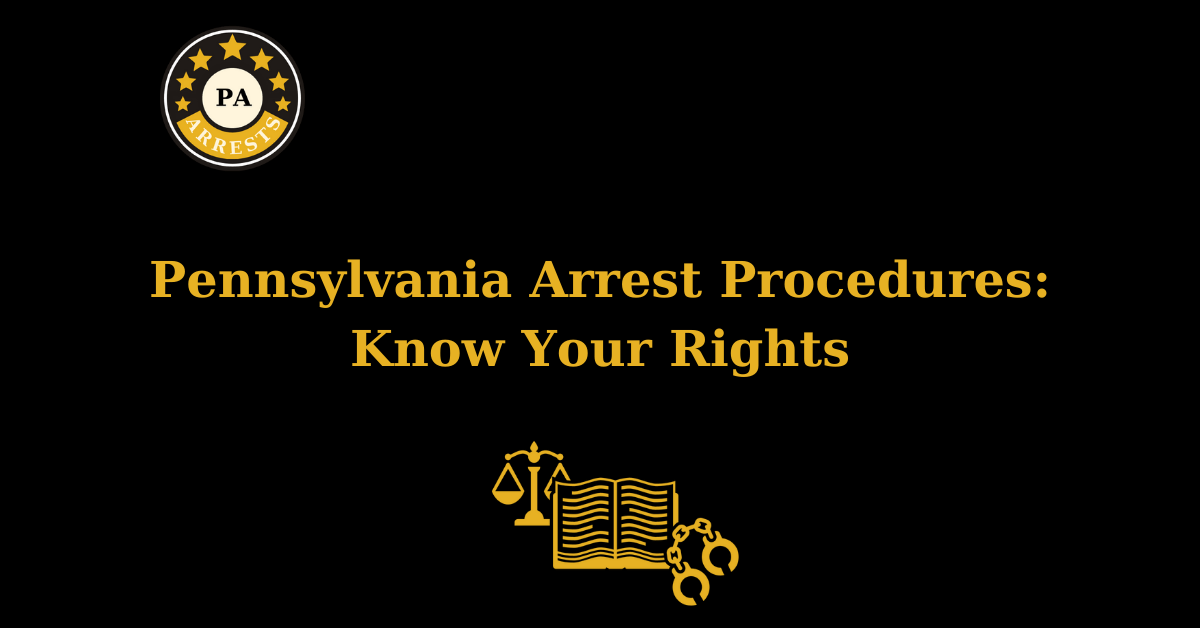Pennsylvania Arrest Procedures: Know Your Rights

In today’s complex world, it is essential to be aware of our rights, especially when it comes to legal matters. Whether you are a resident of the great state of Pennsylvania or just passing through, understanding the arrest procedures in this state is crucial. Being knowledgeable about your rights can make all the difference in a potentially tense situation.
Within these paragraphs, we will delve into the intricacies of Pennsylvania’s arrest procedures, providing you with a comprehensive guide to ensure you are well-informed and prepared. From the moment of arrest to the courtroom proceedings, we will break down each step, shedding light on your rights and the protections afforded to you by the law. By empowering yourself with this knowledge, you will have the confidence to navigate through any legal encounter, ensuring a fair and just process.
Understanding Your Rights
When it comes to legal matters, knowledge is power. In today’s complex world, it is essential to be aware of our rights, especially in the face of potential arrest. Whether you are a resident of Pennsylvania or just passing through, understanding the arrest procedures in this state is crucial.
The Moment of Arrest
It is important to know what to expect from the moment of arrest. Pennsylvania law enforcement officers are required to follow specific protocols when making an arrest. By being informed about these procedures, you can ensure that your rights are protected every step of the way.
Booking and Processing
After being arrested, you will be taken to a police station for booking and processing. This involves recording your personal information, such as your name and address, as well as taking your fingerprints and photographs. Understanding this process can help you navigate through it smoothly.
Interrogation and Miranda Rights
During the arrest, you may be subjected to questioning. It is important to know your Miranda Rights, which include the right to remain silent and the right to an attorney. These rights protect you from self-incrimination and ensure that you have the opportunity to consult with legal counsel.
Courtroom Proceedings
Once you have been arrested, you will eventually face courtroom proceedings. Understanding the legal process can help you prepare and present your case effectively.
Arraignment and Bail
At your arraignment, you will be formally charged with a crime. This is also when bail is determined. Bail allows you to be released from custody while awaiting trial, and understanding how it works can help you navigate this process with confidence.
Pre-trial Motions and Discovery
Prior to trial, there may be pre-trial motions and discovery. Pre-trial motions are requests made to the court to address specific issues, while discovery is the process of gathering evidence. Understanding these steps can help you build a strong defense strategy.
Trial and Sentencing
The trial is where the facts of the case are presented, and a verdict is reached. If found guilty, sentencing will follow. It is crucial to understand the trial process and the potential consequences you may face.
Empower Yourself with Knowledge
By empowering yourself with knowledge about Pennsylvania’s arrest procedures, you can navigate through any legal encounter with confidence. Understanding your rights and the protections afforded to you by the law ensures a fair and just process.
Our comprehensive guide aims to provide you with the information you need to protect your rights. Remember, being well-informed is the first step towards a positive legal outcome.
FAQs
What are the rights of individuals during an arrest in Pennsylvania?
During an arrest in Pennsylvania, individuals have the right to remain silent and not incriminate themselves. They also have the right to be informed of the charges against them and the right to an attorney.
Can the police search my property without a warrant?
In Pennsylvania, the police generally need a warrant to search your property. However, there are some exceptions, such as if you give the police consent to search or if they have probable cause to believe that evidence of a crime is present.
What should I do if I am arrested?
If you are arrested in Pennsylvania, it is important to remain calm and cooperate with the police. You should provide basic identifying information, but remember that you have the right to remain silent and consult with an attorney before answering any further questions.
Do I have the right to bail in Pennsylvania?
In Pennsylvania, most individuals have the right to bail. However, the court may deny bail in certain circumstances, such as if the person is considered a flight risk or a danger to the community.
What happens after I am arrested in Pennsylvania?
After an arrest in Pennsylvania, you will typically be taken to a police station or a county jail. You will be processed, which includes having your fingerprints and photograph taken. Depending on the charges, you may be released on bail or held in custody until your court appearance.
What are my rights during a police interrogation in Pennsylvania?
In Pennsylvania, you have the right to remain silent during a police interrogation. You also have the right to have an attorney present during questioning. It is generally advisable to exercise these rights and consult with an attorney before answering any questions.






